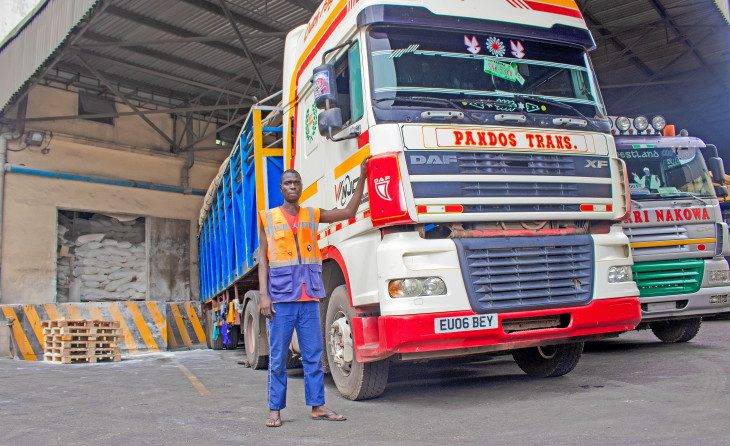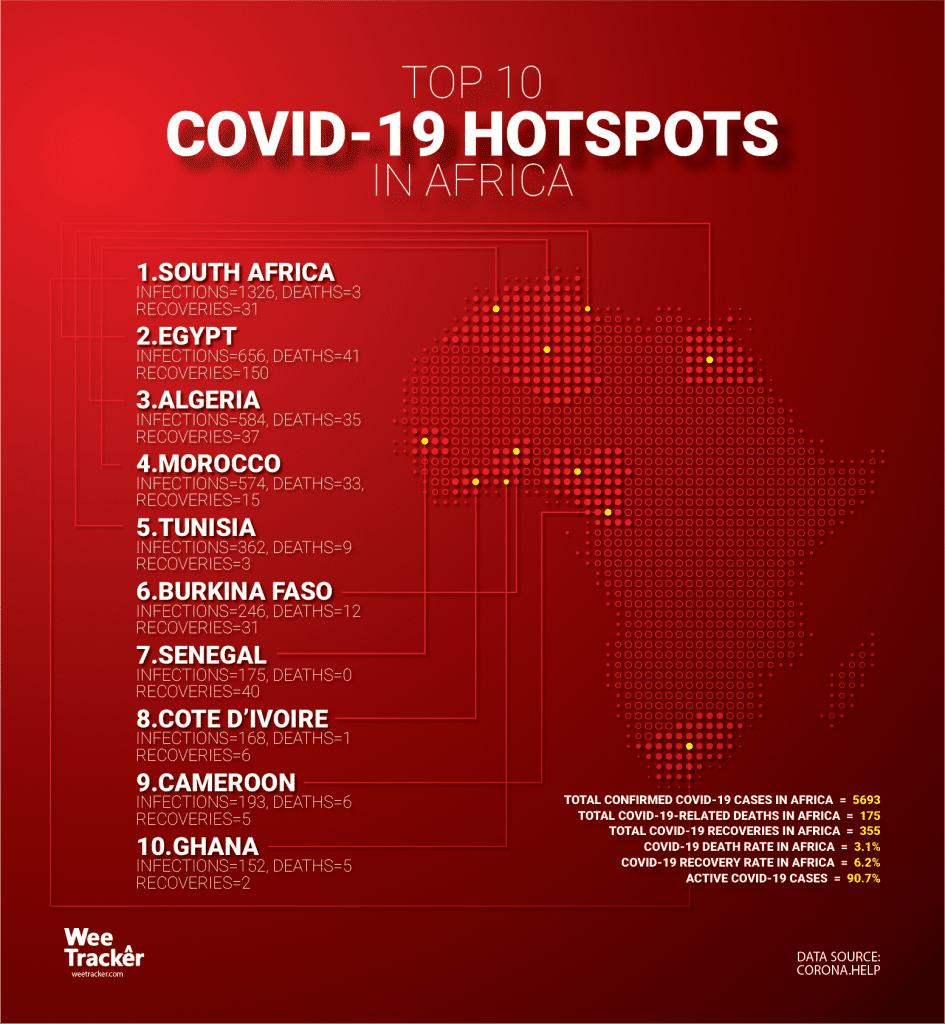Unclear Directive On COVID-19 Lockdown Is Crippling African Logistics & Causing Shortages

The lockdowns/movement restrictions necessitated by the COVID-19 pandemic is crippling the African logistics sector and causing the shortage of essential goods like food, medical supplies, and sanitary wares.
Vessels are stuck, the volume of goods has dropped, agro products have been short by half, and supermarkets and major markets will run out in a matter of single-digit number of days at this rate.
There are now more than 6,000 confirmed cases of the novel coronavirus in Africa and over 200 fatalities.

Unfortunately, those figures are likely to double in the next few weeks as experts have projected that the COVID-19 cases in Africa are not expected to peak until the next two to three weeks at least.
African governments have since moved to intensify efforts aimed at curbing the spread of the virus. Although it started with travel restrictions and bans on public gatherings, things have since climbed to third gear with full lockdowns, curfews, and other forms of movement restrictions among the newest measures.
Countries like Egypt, Tunisia, and South Africa were among the first ones to announce partial/complete lockdowns. Nations like Nigeria, Kenya, Ghana, Rwanda, Uganda, and the Republic of Congo are among other African states that have moved to curtail the movement of people amid the spread of the virus.
The keyword there is “movement of people.” However, in the process of curtailing the movement of people, the movement of goods is also being stifled and this is threatening to morph into untold hardship.
Africa’s Logistics Sector Is Caught In The Lockdown Crossfire
A common theme in the message passed by African governments that have so far adopted measures to keep people grounded is that there are exceptions to every ‘lockdown rule.’
African Heads of State who have placed entire cities on lockdown or curfew have exempted certain essential services — pretty much giving the people providing those services a free pass in these times.
This order does not apply to hospitals and all related medical establishments as well as organizations in health care related manufacturing and distribution.
— Muhammadu Buhari (@MBuhari) March 29, 2020
All seaports in Lagos shall remain operational in accordance with the guidelines I issued earlier. Vehicles and drivers conveying essential cargoes from these Ports to other parts of the country will be screened thoroughly before departure by the Ports Health Authority.
— Muhammadu Buhari (@MBuhari) March 29, 2020
Medical/healthcare establishments, food companies, utilities companies, telecommunication companies, print and electronic media firms, seaports, and logistics firms conveying essential cargoes from ports to other areas, have all been exempted by governments to carry on with their operations despite the lockdowns and curfews.
But some of that ‘exemption notice’ may have gone unnoticed as the movement of goods has been especially hit since the COVID-19-enforced restrictive measures took effect, effectively stalling trade.
One of Africa’s leading e-logistics/e-haulage companies, Kobo360, which boasts 23,000 drivers with operations in West Africa and East Africa, claims that over the last couple of weeks, Africa’s logistics industry as a whole has seen startling figures impacting trade and movement of goods.
And here are some of the worrying numbers touted by the Goldman Sachs-backed startup:
- Around 90 percent of vessels have delayed their arrival time by as much as 40 days.
- The volume of goods moved across the continent has dropped by 30 percent.
- Agro produce has seen the highest drop with 50 percent.
- This is followed closely by pharmaceuticals which has seen a 40 percent drop, and a 25 percent drop in Fast Moving Consumer Goods (FMCG).
- Kenya has the highest drop with about 40 percent drop in movement of goods and Nigeria’s not far behind with 32 percent. Curiously, Uganda has increased its export by 100 percent.
These numbers are expected to soar over the next few weeks, impacting manufacturers who depend on raw materials. With lockdowns/curfews and border closures in Kenya, Nigeria, and other African countries, it’s becoming a really big challenge to keep trucks on the road to ensure tens of millions of people do not go without food, sanitary goods, and medical supplies.
Why African Logistics Is Facing This Problem
As Kagure Wamunyu, Kobo360’s Chief Strategy Officer, revealed to WeeTracker,
“Since Nigeria’s Federal Government announced on Sunday 29 March 2020 that there is far stricter movement around the country, over 3,000 trucks and drivers on the Kobo360 platform have parked their trucks [they have stopped working], as they have wrongly assumed that the trucks and the cargo they are carrying, will be impounded by law enforcement during this lockdown.”
This may be down to the misinformation that is making the rounds and in truth, the message passed by governments on the subject of the lockdown/curfews could have been clearer. In any case, corrupt practices by the officials who are responsible for enforcing the movement restriction order is also a factor.
For instance, when the Lagos State Government outlawed commercial motorcycles (Okada) in certain key areas of the State, there were reports of law enforcement impounding delivery/courier service bikes and demanding payoffs even though dispatch riders were clearly exempted when the ‘Okada ban’ was announced.
Now, even as logistics operators who convey essential products have been exempted from the lockdown, though not without special requirements, drivers are basically scared to hit the road for fear of harassment. This is slowly choking the life out of supply chains.
And why’s this happening? It’s because African governments have not really given a ‘clear’ directive to drivers of essential goods, as well as the enforcement officers, that goods are able to move freely, of course with the correct requirements, so as to keep goods and important services moving across the continent.
As Wamunyu puts it, it’s a critical time for food security and trade and it’s not a good idea to just stop all trade by drastically disrupting and upending the supply chain. And that’s because the consequences might just be as bad as the raging COVID-19 pandemic itself, or even worse. Either way, it’s more problems at a time when the world could really use less.
“Logistics is extremely important to Africa even under normal circumstances. So when you think about the scale of the need for logistics during this COVID-19 pandemic, it becomes especially crucial.
“Because of the misinformation out there, we are now on high alert, and we foresee that produce, medical and key items will run out across supermarkets and major markets in the next 7 days,” she added for emphasis.
How Can This Be Fixed?
For starters, better communication could help smoothen things, as the Kobo360 executive explained.
“What we are urgently asking the government to do is issue a clear statement that we can send to our drivers so that they no longer fear that they will be arrested for carrying out the essential cargo and last-mile delivery work they should be doing. We want them to come back onto the road today and to keep the wheels of supply chain moving. To keep Africa moving,” Wamunyu told us.
“We are using every resource we have to continue the movement of goods to ensure that at the very least, people have access to food, sanitation, and medicine. We want to ensure food security is central to each and every government’s policy in tackling this.”
Keeping costs down is the immediate challenge being faced by manufacturers, producers, and merchants as they struggle with the effects of a 30 percent reduction in the movement of goods.
The reduction has meant that manufacturers, for example, have had to increase their prices to cover the shortfall. This is evident in how much the prices of everyday commodities have shot up recently.
More so, many African producers, manufacturers, and merchants get their raw materials and products from China. Due to China’s lockdown, there have been no shipments at the ports for the last two months.
The effects of this may not be felt until May or June, this is why measures need to be taken to cushion the impact in order to protect these businesses.
And that’s why logistics startups like Kobo360, which typically move goods from the ports to the merchant, are now calling on African governments to continue to allow drivers with cargo to cross borders and ensure continuity of trade. This will ensure that essential goods move freely during these challenging times.
As Kamunyu emphasised, “We are open to dialogue and supporting governments across the territories we operate in, to combat the severity of the coronavirus pandemic, as we believe it is important to fight this collectively. We have been engaged in conversations and secured partnerships with a number of private sector key players to reduce costs of delivery for instance.
“However, our drivers need to know that they are safe to drive the trucks to deliver essential goods and do so without restrictions; their safety – both in terms of Coronavirus, but also in terms of not being attacked or arrested on the road, is crucial. This can only happen with clarification from the governments,” she reiterated.